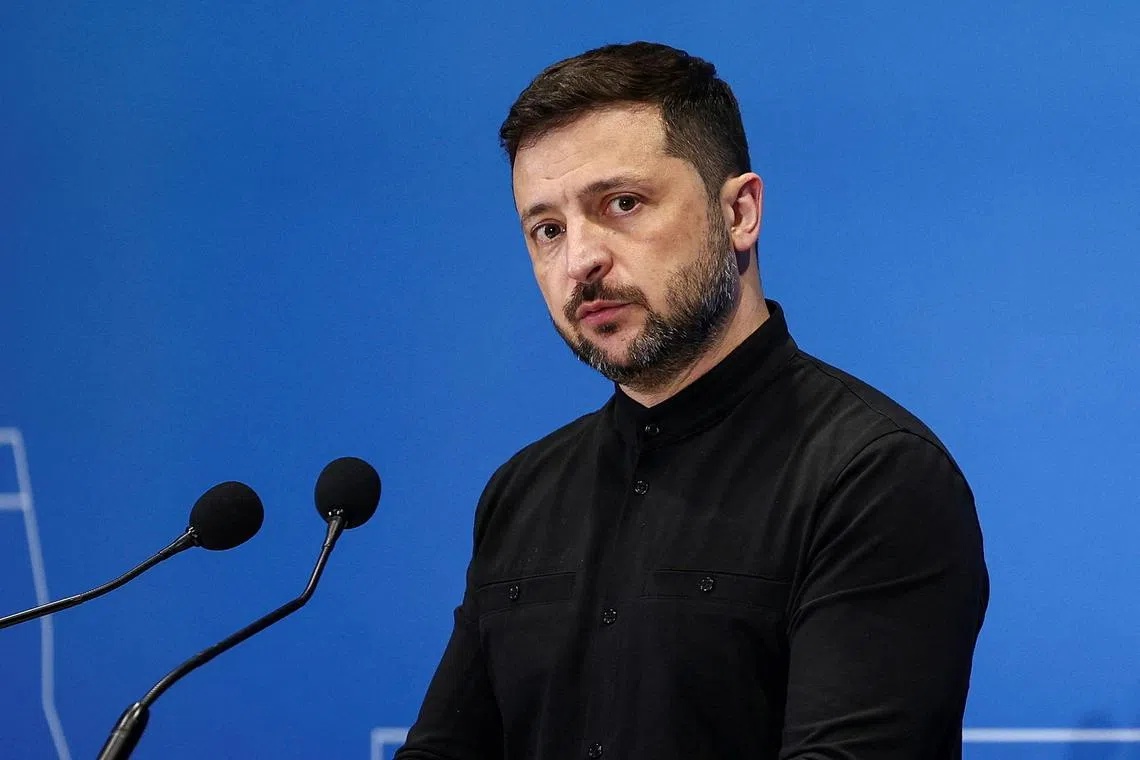Explainer: Zelensky’s move against Ukraine’s anti-corruption agencies
Sign up now: Get ST's newsletters delivered to your inbox

Ukrainian President Volodymyr Zelensky says his country’s anti-corruption agencies need to be “cleansed” of Russian influence.
PHOTO: REUTERS
KYIV – Ukrainian President Volodymyr Zelensky is under pressure at home and abroad for stripping the independence of anti-corruption agencies whose work is seen as essential to Kyiv’s path to join the European Union.
Amendments giving his appointed prosecutor more power over the two investigative bodies have drawn criticism from top EU officials and sparked the country’s largest wartime protests.
Here is more on what they are, and what he said about them.
What are Ukraine’s anti-corruption agencies?
The National Anti-Corruption Bureau of Ukraine (Nabu) and the Specialised Anti-Corruption Prosecutor’s Office (Sapo) were set up after a 2014 revolution toppled a pro-Russian president and set Kyiv on a Western course.
They are responsible for independently weeding out high-level graft, a central requirement for Ukraine to receive billions of dollars in Western aid and join the 27-member EU.
The agencies have stepped up their work during Russia’s full-scale invasion, producing charges against lawmakers, senior government officials and a former deputy head of Mr Zelensky’s administration.
In June, they accused a deputy prime minister of accepting a US$345,000 (S$440,000) kickback.
Why have their powers been curbed?
In a late-night address on July 22, Mr Zelensky said the agencies needed to be “cleansed” of Russian influence, and their work strengthened and sped up.
A day earlier, Kyiv’s domestic security agency had arrested two Nabu officials on suspicion of ties to Russia and conducted sweeping searches
The new measures, which were fast-tracked in large part by Mr Zelensky’s ruling party, allow the general prosecutor to transfer cases away from the agencies and re-assign prosecutors, several lawmakers said.
Critics, including an anti-corruption campaigner charged in July with fraud and evading military service, have alleged the crackdown was a politically motivated response to their work.
What was the reaction?
After the vote, the EU’s enlargement commissioner said she was “seriously concerned” about the measures, and on July 23, Germany’s foreign minister warned Kyiv against hampering its path to the EU.
At home, thousands of Ukrainians rallied in Kyiv
Fighting corruption and embracing the West, especially since Moscow’s 2022 invasion, are seen as critical to erasing a legacy of Russian rule.
Ukrainians are furious at signs of corruption and misrule at a time when tens of thousands of troops have been killed on the front fending off Russia.
“My brother didn’t die for this kind of future,” read a placard at the Kyiv protest.
What’s next?
On July 23, Mr Zelensky said he had met with anti-corruption and security officials to hash out a joint plan within two weeks to better combat corruption.
Writing on X, he said the officials would aim to “resolve existing contradictions, and eliminate threats”.
“We all hear what society is saying,” he said. “We see what people expect from state institutions.”
Still, Nabu and Sapo said in a joint statement on July 23 that they wanted their independence restored through legislation.
Meanwhile, lawmakers pledged to challenge the amendments while Ukrainians on social media called for continuing public protests. REUTERS


